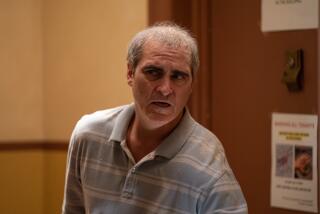Q & A with Russian film director Andrei Kavun
Andrei Kavun is the director of “Kandahar,” a Russian film about the true story of a civilian flight crew that escaped from the Taliban in 1996 after being held hostage in Afghanistan for 378 days. The film is loosely based on the diary and memories of the crew’s captain, Vladimir Sharpatov.
What interested you about Vladimir Sharpatov’s story? Why did you choose him as the focus of the film?
Before I went to meet Sharpatov in his home in Siberia, I was imagining him as a kind of Russian Bruce Willis. But the man who met me at the door was very quiet and very, very shy. The country no longer remembered him, and he was content with that. During our first meeting, I asked him whether he realized what a heroic deed he and his comrades committed. He said: “You know what I was thinking, all the days we were in captivity and even during the escape? That after a year in prison we’ll lose our jobs because we won’t even be able to pass a physical.”
At first this character may look like a conformist, even a coward. Not a hero by Russian standards. He is not ripping his shirt off his chest, blocking machine-gun fire with his body, screaming, “We Russians don’t surrender.” But in the end we see what this man stands for. We’ve seen a lot of loud-mouthed heroes in our country.
What role did Sharpatov play in the filmmaking? What is your relationship with him?
At first I spent several days at the table with him, but it was difficult to make him tell the real story because he used all these trite newspaper cliches. I was getting really desperate. Then we got ourselves a bottle of vodka, cooked a bowl of Siberian pelmeni [dumplings] and had a real Russian-to-Russian conversation. And every detail started to pour out of him the way I wanted to hear it.
Sharpatov gave me his diaries from that period. He was also present a few times at the set. He gave some advice but never really interfered. His only request was that none of his comrades should feel hurt or offended by our story. . . .
After a disastrous war that’s associated with the weakening of the Soviet empire, what place does Afghanistan occupy in the Russian imagination?
For those who fought there and smelled the sand and dust, it was a sacred war because the blood of their comrades was poured richly across that land. Some think that it was just a blunt aggression and occupation. Yes, we invaded another country and it was an occupation. But let’s face the hard facts. Now Americans are invading Afghanistan for basically the same reasons: to combat global evil.
I think it is impossible to conquer Afghanistan. It’s the kind of country where everybody, even the children, will fight against the invader. Americans still believe that they will build McDonald’s there and sell U.S. jeans on every corner, and everything will be OK. No, it will not be OK. Afghanistan is to us what Vietnam was to the Americans. It is part of our history now.
In the years after Vietnam, U.S. filmmakers grappled with the experience. Has Russia gone through a similar cinematic consideration of Afghanistan?
I grew up on those movies. You are lucky in the sense that, whatever happened over the past century, Hollywood existed. We were not so lucky. There was a considerable period after the Afghan war and the breakup of the Soviet Union when our movie industry almost ceased to exist. Our studios and movie theaters were idle.
The pain of Afghanistan was very much there and attempts were made to address it cinematographically. But they were very few and they received an undeservedly shallow response.
Your film comes out against the backdrop of the U.S.-led war in Afghanistan. How have the NATO experiences in Afghanistan contributed to the mood and ideas during the filmmaking?
You know, quite a few sequences in our movie are graphically designed after the video footage you can find on YouTube, where you can find brazen American soldiers shooting at mosques or Taliban fighters beheading NATO soldiers. Visually, little has changed. The same things happen there now which happened back then when the Soviet troops were stationed there.
Does this film have a moral thread?
My main moral thread was not about Afghanistan, but about contemporary Russia. In the Great Patriotic War [World War II], we were all Russians whether we were Jews, Chechens, Tatars, Georgians, Ukrainians, Russians or others. When Nazis captured a Soviet soldier who was a Chechen, they called him a Russian and they killed him as a Russian.
Now we have grown very particular about our ethnic, confessional and other differences to the point that we can no longer exist next to each other. My movie is about five different people who are caught up in a tragic situation which aggravates their differences. Each one thinks that he is right and each one has a right to his truth. But only when they put their differences aside do they manage to survive together and make a heroic escape. It is about coming to terms with each other, making allowances and compromises.
Do you think Russia should join the NATO effort to destroy the Taliban in Afghanistan?
Certainly not. I think it is a senseless war.
Loiko is a Times staff writer.
More to Read
Only good movies
Get the Indie Focus newsletter, Mark Olsen's weekly guide to the world of cinema.
You may occasionally receive promotional content from the Los Angeles Times.






